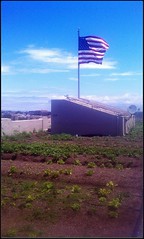Southside CSA in Brooklyn - Supporting Local Farmers Through Community Shared Agriculture
With more and more New Yorkers clamoring for the freshest greens green can buy, CSA (Community Supported Agriculture) pickups are sprouting up around the five boroughs. Southside CSA is one of the trend's latest offshoots opening just this year and serving the Greenpoint and Williamsburg areas of Brooklyn.
Just as with the NYC Greenmarkets, the ubiquitous citywide farmer's market, CSA shares-veggies, fruits, eggs, and wine-hail from Hudson Valley farmlands. However, there is one key distinction between the systems.
"You don't get to choose your produce, but you're sharing in the farmer's bounty," said CSA core group member, Esther Giangrande. Ms. Giangrande teamed up with the other founding group members through the Greenpoint-Williamsburg CSA low-income fundraising committee. She had been using the CSA's current pickup location, Bridget Urban Wine Bar in Williamsburg, as a venue for fundraisers to benefit Greenpoint Soup Kitchen.
The way a CSA works is that before the harvest season begins, (for Southside CSA's produce, the season runs for 20 weeks, from June 22 through November 2), members decide whether they would like to purchase a full share or half share. All CSAs are based on a similar concept. Share prices are literally seed money for the farmer, based on what is needed to grow the crops promised for the season. For greens only, full shares cost $ 400 per season, and members pick up their weekly veggie supply every Monday at night Bridget. With half-shares, which cost $ 200, the pick-up is only every other week. Over the course of the 20 weeks however, the different shares amount to $ 20 worth per week, roughly the amount that the farmer would receive at market for his goods. Because full shares are so large, it is not uncommon for three or four locals to divide the produce. Before each pickup, a list of arriving vegetables is posted on the Southside CSA blog, leaving time for members to find suitable recipes or organize impromptu dinner parties.
Southside CSA is unique in that the share has a spicy twist: in keeping with the neighborhood's Latin tradition, the vegetables include several staple ingredients for Mexican meals such as sweet corn, cilantro, and quelites from the Mexican-influenced MimoMex Farm, alongside produce characteristic of the Hudson Valley.
For some, the appeal of Southside lies in the uncertainty of the outcome of the harvest season. While with the payment of the share money there is an expectation that the promised produce will be delivered, nothing is definite. In that way, CSAs offer more than just fresh vegetables, they offer an insight into the farming experience.
Another unique aspect of the CSA system is that there is no set staff aside from the few founding members; instead, it depends on the dedication of its members to volunteer to help with organizing the pick-ups (much like a food co-op). A member-base workforce is what makes So uthside so sustainable: by taking care of the distribution and marketing of the incoming goods, the CSA saves busy farmers the burden of worrying about storage and shipping. Standard shift duties include meeting and unloading the produce truck, setting up for fruit and vegetable pickup, and helping distribute the produce to fellow members.
Southside CSA is more than just artichoke heart; it's core members are committed to local outreach and uphold their pledge to fresh food for all by donating leftover pickup vegetables to soup kitchens. Southside CSA has partnered with Craig's Kitchen, a local community action group, that supplies soup kitchens around Williamsburg, Greenpoint, and other Brooklyn neighborhoods. The organization shares the CSA's belief in healthy, organic, and fresh meals for all.
The CSA movement has had incredible momentum, with more than 18 new distribution centers opening just this year in addition to Southside (there were about 50 CSAs in 200 8); compared to the NYC Greenmarket, which has 46 locations throughout the boroughs, it seems that the CSA are becoming a favored local destination for fresh food. Not only does a CSA membership provide you with more beets for your buck, but it's also more convenient because chances are there is one right in your neighborhood.
[The Bridge Wine Share, wines exclusively from the Bridge Vineyard of North Fork, Long Island, are $ 360 full/$ 180 half. The NY Wine Share, a mix of reds and whites from the various wine-producing regions of the state from Long Island to the Finger Lakes to the Hudson Valley, are $ 400 full/$ 200 half. Like the produce and egg shares, wine shares are also distributed Monday evenings at Bridget. The vegetable and fruit shares complement weekly wine offerings.]
Caitlin E. O'Connell, freelance writer for One Earth, invites you to submit your knowledge of sustainability to the index on http://www.One-Earth.com. The index works like Wikipedia and it's free. By contributing to the index, you'll help people find ways of reducing their negative impact on the environment. You can also search and browse for ways to reduce you're negative impact on the environment. The index is organized by city and further broken down into categories, so it's very easy to find what you're looking for.
Article Source: http://EzineArticles.com/?expert=Caitlin_O'Connell
